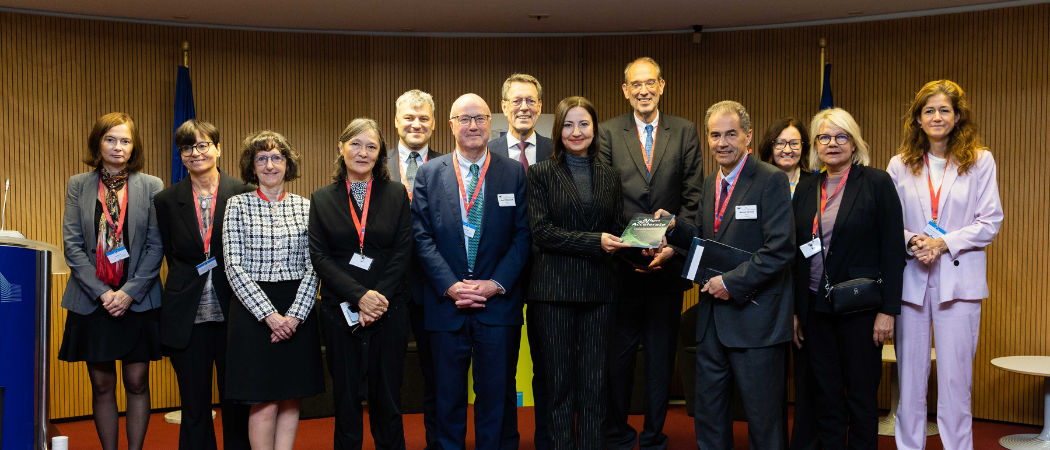Industry endorses the idea of two new councils, to oversee industrial competitiveness and technology, and European societal challenges

Research commissioner Iliana Ivanova (sixth from the right) and the European Commission’s expert group led by Portugal’s former science minister Manuel Heitor (fourth from the right) during the publication event of the High-Level Group report on the mid-term review of Horizon Europe on October 16, 2024, in Brussels, Belgium. Photo credits: Bogdan Hoyaux / European Union
After months of waiting and speculation, the European Commission’s expert group led by Portugal’s former science minister Manuel Heitor has published a bombshell of a report calling for a momentous overhaul of the EU’s research and innovation programmes.
Among many other recommendations, the report urges the creation of two new bodies, an Industrial Competitiveness and Technology Council, and a European Societal Challenges Council, to steer collaborative research.
The proposal comes after years of complaints that industry involvement in Horizon Europe has been declining and that decisions about funding calls and priorities are mostly left in the hands of the Commission.
Speaking at the launch of the report in Brussels on Wednesday, Anthony Gooch, secretary general of the European Round Table for Industry said the proposal to create two independent councils is “excellent” but that the Commission needs to ensure more funding is channelled to technology transfer and applied research, which “can end up in something tangible”.
Mark Ferguson, former chair of the European Innovation Council board and member of the Heitor group, said the new industrial technology council would ensure stakeholders have a say on pre-competitive research, partnerships, and other mechanisms. “Who better to drive that than the industry themselves?” he said.
Another Heitor group expert, Annelein Bredenoord, rector magnificus at Erasmus University Rotterdam, said the council on societal challenges would help universities coordinate transdiciplinary programmes, where “scientists, industry, policy makers, and civil society work together.
One of Europe’s main industry lobby groups, BusinessEurope, welcomed the Heitor report and the proposal to boost the role of industry in EU research projects.
“We support the idea of such a council, as we need to strengthen industry’s role in steering and promoting the work of large-scale industrial and collaborative research projects,” Alexandre Affre, the group’s deputy director general for industrial affairs told Science|Business.
University lobby groups are more sceptical about an Industrial Competitiveness and Technology Council and a Societal Challenges Council. The League of European Research Universities (LERU) said the idea is interesting but could also lead to additional complexity and overlap between funding streams. However, if the two councils were run by “eminent practitioners/researchers”, then the next research programme, FP10, could be more independent of “political steering and very long and bureaucratic interservice consultations,” LERU said.
Radical simplification
The Heitor report wants to see a “trust first/evaluate later” grant application system, in order to reduce bureaucracy.
Horizon Europe applicants decry the 12% success fees they have to pay external consultants, delays of up to 278 days between calls closing and grant agreements being signed, increasingly complex application forms, and overlapping instruments within the programme.
“It’s really a pity that under the Horizon Europe the complexity of the grant system increased,” said Robert-Jan Smits, president of Eindhoven University of Technology, who was directly involved in the design of EU research framework programmes as former director general for research and innovation at the European Commission.
“The big steps that were taken under Horizon 2020, with the introduction of a single funding rate for all types of participants and a much shorter time to grant, should be repeated once more,” Smits told Science|Business.
Universities want a less onerous grant application procedure in FP10. “We are also pleased to see a strong focus on simplifying processes for beneficiaries, which we think is crucial for improving success rates and broadening access to the programme,” said Amanda Crowfoot, secretary general at the European University Association.
Policy driven
In parallel, LERU secretary general Kurt Deketelaere has a bone to pick with the Commission over behind-the-scenes discussions about the next EU multiannual budget.
Deketelaere notes a discrepancy between the Heitor report and recent political developments: the political guidelines for the new Commission indicate that the next EU budget, due to start in 2028, will be policy driven, not programme driven. The mission letter to commissioner designate for research and innovation, Ekaterina Zaharieva, does not mention the drafting of FP10, and leaked budget proposals suggest that a number of R&I funding sources should be bundled into a single European Competitiveness fund.
“I repeat today my call on commissioner Ivanova and director general [Marc] Lemaître to provide, as soon as possible, some clarity on the future of EU R&I funding and the role of the framework programme,” Deketelaere said.
The launch of the Heitor report was attended by a who’s who of the EU research and innovation bubble, most of them lobbyists, but also a few academics and officials from the Commission and the European Parliament.
The one thing missing was a clear response from the Commission to the 12 recommendations in the report. Speaking at the launch, Lemaître said some of the proposals are “radical” but did not elaborate. “Not much in terms of details has been written in the documents that are public, be it mission letters, be it political guidelines,” he said. “There are lots of details to be filled out.”





 A unique international forum for public research organisations and companies to connect their external engagement with strategic interests around their R&D system.
A unique international forum for public research organisations and companies to connect their external engagement with strategic interests around their R&D system.